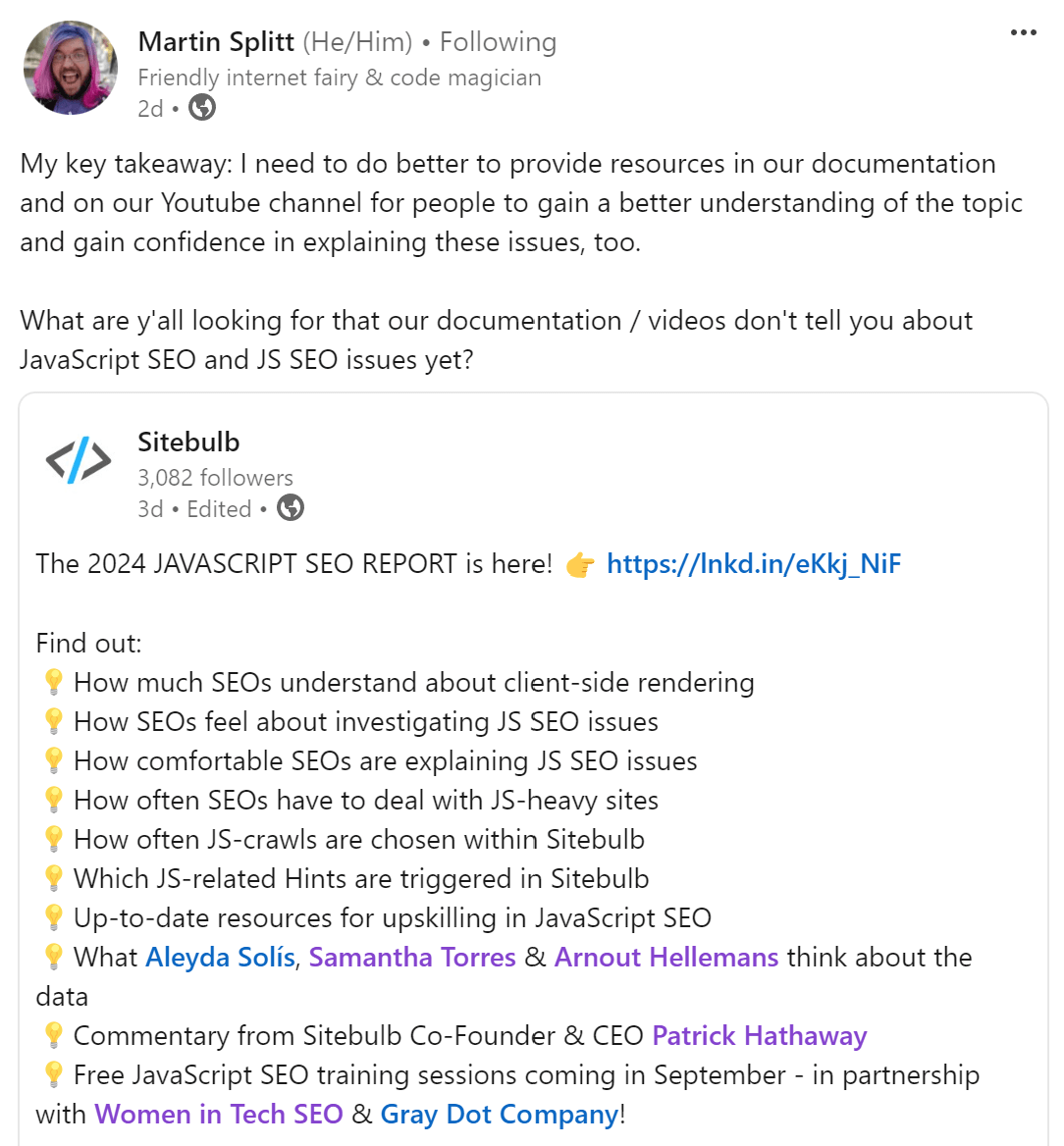Industry discussion
In the week since the report launched on August 5, 2024, the JavaScript SEO Report has been discussed and shared in various places; most notably perhaps by Googler, Martin Splitt, who said his key takeaway was, "to do better to provide resources in our documentation and on our Youtube channel for people to gain a better understanding of the topic and gain confidence in explaining these issues, too."

Featured in SEO podcasts and webinars
-
Crawling Mondays with Aleyda
Crawling Mondays with Aleyda
-
SEOs Getting Coffee by Vixen Digital
A broader discussion around JavaScript SEO
-
Search with Candour Podcast
Discussing the importance of understanding Google's rendering process
-
Edge of the Web Podcast
Patrick & Erin Sparks chat about what JavaScript SEO means to the industry
What SEOs had to say about it

“Brilliant and interactive piece or reporting from Sitebulb! Definitely worth reading especially if your site relies heavily on SEO.”

“The Javascript angle is becoming much more prominent. It can be a force for good, but (this report) shows most SEOs are a bit lost at sea.”

“SEOs used to scream in terror when discovering a website was made with JavaScript. Some SEOs today still swear that search engines don't render JS, and the statistics in this report show that 41.6% of the survey takers hadn't even read Google's documentation on JS rendering. All this is to say that, as an industry, we need to level up our understanding of JS and how to optimize websites to utilize it best. JS isn't going away anytime soon.”

“I think there's a lot of confusion around if JavaScript SEO matters; I've often seen debates on Twitter whether as a concept it should exist or not. I think conversations like that have made JavaScript a more confusing aspect of SEO. If someone you might look up to in the industry is saying it's not a thing then why should someone look into it. But it very much is a concern for us. I think this report does great at showing us that it's important and a huge portion of SEO practitioners are auditing/optimizing JavaScript on a regular basis.”

“Some days you read a stat like smelling salts: '41.6% of SEOs (in the survey) said they definitely hadn't read or weren't sure if they'd read Google's documentation around JavaScript rendering.' My eyes are watering. The sentence before that proudly declared 94.4% of respondents said understanding what content Googlebot sees when crawling websites is critical! (Is rendering the equivalent of flossing!? You know it's important but nah?) It was the third stat that broke me: '10.6% of SEOs said they perfectly understand how Google crawls, renders & indexes JavaScript.' ...This report, published by Sitebulb and featuring Arnout Hellemans, Aleyda Solís & Samantha Torres, walks through the state of JavaScript SEO. My favorite bit is the recap of the top JS Hints triggered in the tool.”

“One of the primary challenges of Google’s documentation on JS rendering is that it seems squarely aimed at developers, when it should ideally meet the needs of two very different key stakeholders: developers AND SEOs. It should explain things in both “languages,” while finding a way to bridge the gap between them. It’s a daunting task, for sure, and the current approach leaves a lot to be desired. At Gray Dot, we find that using this documentation doesn’t put us much closer to being on the same page in terms of what’s needed for SEO and why — even when working with highly experienced developers. If senior developers and 15+ year SEOs can’t connect the dots, it’s a good sign these resources are falling short.”

“It's seductive to only look at webpages in their complete rendered form. Even Google's own tools, such as Inspect URL in Search Console and the Rich Results test, use the fully rendered version of a submitted webpage. Yet this provides an incomplete picture of a page's performance on the web. Strip out a page's client-side JavaScript and see what's left - that's the first version of the page that every crawler on the web (including Googlebot) sees. Rendering is not a swift, nor a faultless process. So many things can go wrong, and it's wise to avoid relying on client-side code for critical page content.”

“(Google's documentation) was made for developers by developers, that much is very clear. But based on my experience, developers AREN'T reading them.”
Ideas and suggestions from the community
- Sam Torres: "One idea would be some side-by-side content that’s taking the existing points “for developers” and then “for marketers”. This could even be presented in similar ways that other Google documentation covers different languages or tech stacks. Which also brings up another thing I would love to see: more support and context for the most popular JS frameworks."
- Billie Geena Hyde: "I wish there was a deep dive into common JavaScript usage/problems across different niches and what that means for SEOs - I think something like that would be massively helpful for Junior Tech SEOs to understand how widespread JavaScript usage is across the web."
- Julian Roben: "I would love a Google endorsed guide that I would be able to use which is simple enough at the jump to aid stakeholder management 🙏 I found it tough to simplify it enough for executive eyeballs."
- Dario Ciraci: "It might be useful to integrate JS recommendations into Search Console alongside the upcoming recommendation features announced yesterday."
- David Minchala: "Nearly all docs are geared toward websites of "normal" size and if they acknowledge that mileage will vary for a large site (1M+ URLs), they link to this doc here and call it a day. Large site JS docs would be neato."
- Keith Goode: "I'd love to have a better understanding of internal link discovery for dynamically-rendered JavaScript site. As a follow-up to that, I'd love to see any data on comparing how quickly Googlebot crawls the entirety of a static website vs. the entirety of a dynamically-rendered JavaScript website. I've always assumed that with Google having to render a site before the links appear there would be a delay."
What did you think of the report?
Let us know by tweeting us @sitebulb or tagging us on Facebook or LinkedIn. And if you want to learn more, register for our free on-demand JavaScript SEO course in partnership with Women in Tech SEO and Gray Dot Co - it's open to all!

